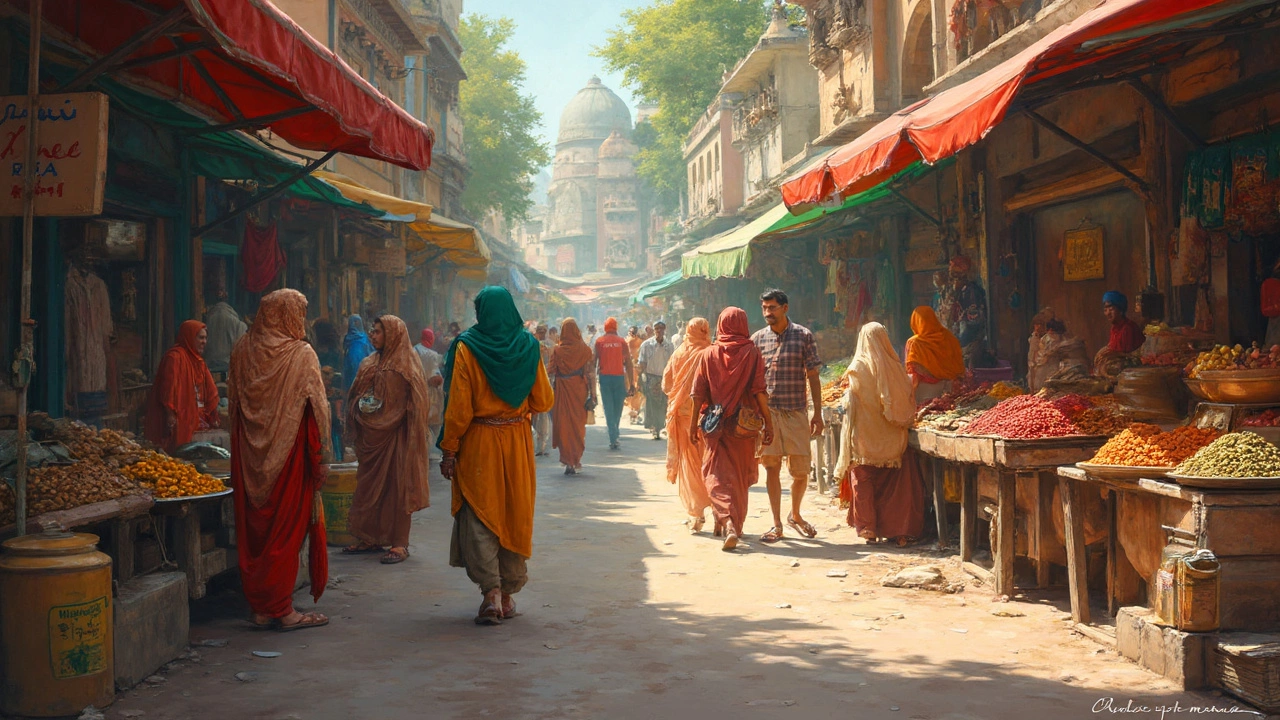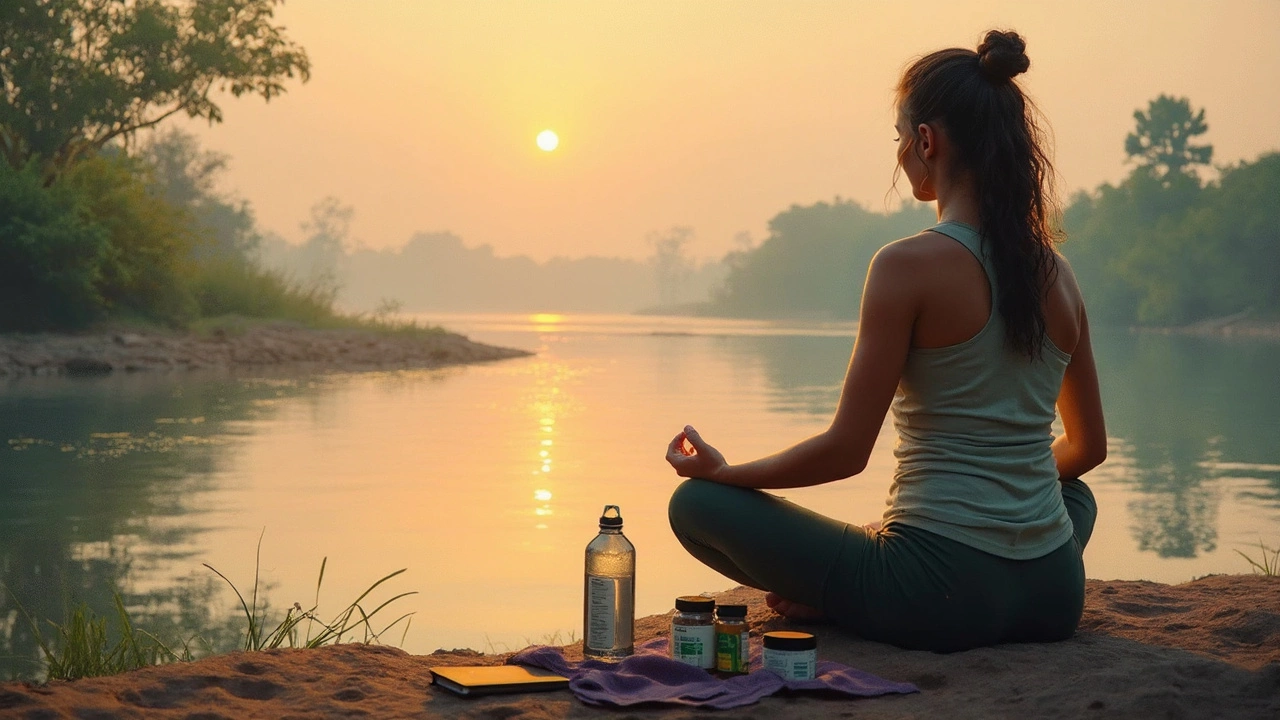How to Recover from Delhi Belly Quickly
 Mar, 22 2025
Mar, 22 2025
If you've ever been to India, chances are you've heard of the infamous Delhi Belly. It's that stomach bug that seems to catch even the most prepared travelers off guard. So, what does one do when struck by this unwelcome visitor? And more importantly, how long does it take to get over it?
First, let's talk about what you're likely experiencing. Delhi Belly is essentially a case of traveler's diarrhea, often caused by unfamiliar bacteria. Symptoms include, you guessed it, diarrhea, along with stomach cramps, nausea, and sometimes fever. The good news? For most people, it only lasts a couple of days.
But when you're budgeting your way through India, two days can feel like an eternity. So, what's the fastest way to feel better? Spoiler: it's all about staying hydrated, resting, and maybe hitting up the local pharmacy for some trusty over-the-counter meds. Keep those joints lubricated with good old H2O and give your body some time to recuperate.
- Symptoms and Duration
- Effective Home Remedies
- Over-the-Counter Medicines
- Preventive Measures
- When to Seek Medical Help
Symptoms and Duration
Dealing with Delhi Belly might not be on your travel bucket list in India, but hey, information is power. So, what exactly are we talking about here? Primarily, it's traveler's diarrhea, a not-so-glamorous term for when your digestive system freaks out.
The Usual Suspects
Symptoms often start with a rumbling tummy, then escalate to more noticeable discomfort. You'll likely experience loose motions, stomach cramps, and possibly nausea or vomiting. Sometimes it's accompanied by a slight fever, just to make things interesting.
Traveler's diarrhea generally kicks in within hours or up to a couple of days after consuming contaminated food or water. Oddly enough, while it usually feels like you're wrestling a storm down there, most cases aren't serious.
Typical Duration
On average, the misery lasts between 24 to 48 hours. But don't let a few days scare you; it's usually mild and clears up on its own with some basic care.
If you're among the less fortunate 20% of travelers, it might stretch to a week. But hey, those cases tend to ease up with rest and hydration.
Quick Tip
While you're recovering, make sure you're near a bathroom and drink plenty of fluids. Dehydration is your enemy while you're dealing with Delhi Belly. And remember, if symptoms persist beyond a few days, or get worse, it might be worth checking in with a local doctor. They deal with this daily and can help you swiftly get back to your itinerary-stuffed adventure.
Effective Home Remedies
Feeling under the weather with Delhi Belly? No worries, you're not alone, and you're in the right place. While it might be a little uncomfortable, there are several home remedies that can ease your symptoms and get you back to exploring in no time.
Hydration is Key
The most crucial thing to do is to stay hydrated. Diarrhea depletes your body of essential fluids, so drinking plenty of water is a must. To boost recovery, consider oral rehydration solutions available in most local pharmacies. They replace lost electrolytes and speed up your healing process.
Ginger Tea
Ginger isn’t just for treating colds. Brewing a cup of ginger tea can help soothe your stomach and reduce nausea. Just boil a few ginger slices in water, add a bit of honey, and enjoy the calming effects.
Bananas and Rice
Ever heard of the BRAT diet? It stands for Bananas, Rice, Applesauce, and Toast—some of the most stomach-friendly foods. Bananas and rice are especially helpful due to their binding effect, which can lessen the runs.
Yogurt
Sneak some probiotics into your diet. Natural yogurt contains helpful bacteria that can restore balance in your gut. Local Indian dahi is a great, budget-friendly option you can easily grab from any market.
| Home Remedy | Benefit |
|---|---|
| Hydration | Keeps fluid levels in check |
| Ginger Tea | Calms the stomach |
| Bananas and Rice | Reduce diarrhea symptoms |
| Yogurt | Restores gut health |
Mental Rest
It’s not just about physical rest. Traveling can be overwhelming, and stress doesn’t help your tummy. Take some time to relax, maybe catch a Bollywood flick in your hotel room, and give yourself a mental break.
Incorporating these tips will have you back on your feet in no time. Remember, listening to your body and taking the necessary steps is key when dealing with this pesky travel bug.

Over-the-Counter Medicines
When dealing with Delhi Belly, over-the-counter medicines can be lifesavers for getting back on your feet quickly. While no one loves the thought of spending their Indian adventure searching for a pharmacy, a quick trip can make all the difference.
Essential Medications to Have
- Oral Rehydration Salts (ORS): To combat dehydration, ORS packets mixed with clean, boiled water help replenish lost electrolytes.
- Antidiarrheals: Popular choices like loperamide (Imodium) can decrease bathroom trips. However, use them sparingly and avoid if you have a fever or suspect a bacterial cause.
- Probiotics: These can be found easily in many pharmacies and help balance out your gut flora for faster recovery.
- Pain Relievers: For cramps and fever, paracetamol (acetaminophen) is useful and widely available.
Finding What You Need
In India, pharmacies often carry the items you need and usually remain open late. Brand names might differ from those at home, so knowing the generic names helps. For instance, ask for 'ORS' rather than looking for a specific brand.
Quick Stats
About 30% to 50% of travelers visiting tropical and subtropical regions experience some form of traveler's diarrhea, so you're not alone in this. This condition is usually mild, but it's always good to come prepared with a basic plan.
While budget travel India trips might include unexpected challenges, a little pharmacy run can provide much-needed relief. And remember, if your symptoms persist beyond a few days, it's best to consult a doctor. Stay informed, stay prepared, and enjoy your travels!
Preventive Measures
Getting through India without catching Delhi Belly might seem like a mission impossible, but it's actually doable with some care and attention. While nothing guarantees immunity, these preventive measures can significantly reduce your risk.
Watch What You Eat
First rule of thumb? Be wary of street food. As tempting as it is to dive into those delicious-looking chaats, stick to food that's been cooked hot and fresh. Boiled, peeled, or well-cooked items are generally safer options.
Drink Carefully
Water quality varies a lot in India, and it's a major culprit of Delhi Belly. Always opt for bottled water with a proper seal and avoid ice cubes unless you're certain they're made from purified water. For an extra layer of safety, consider carrying a portable water filter or purification tablets.
Use Hand Sanitizer
Don't underestimate the power of hygiene. Keep a bottle of hand sanitizer handy, especially when soap and clean water aren't available. Use it before eating or touching your face.
Respect Your Limits
Indian food is full of spices and flavors that might be heavier than what you're used to back home. Start slow and let your stomach adapt. Avoid spicy and overly greasy foods initially to see how your body reacts.
- Stick to fresh, hot-cooked meals.
- Drink only from sealed, trusted sources.
- Sanitize hands before meals.
- Ease into local cuisine slowly.
By following these simple yet effective steps, you stand a much better chance at keeping Delhi Belly at bay and enjoying your trip without interruptions.

When to Seek Medical Help
Though Delhi Belly usually resolves on its own, there are times when reaching out to a healthcare professional becomes necessary. So how do you know when it's time to trade self-care for expert advice?
Severe Symptoms
If the diarrhea lasts more than three days or at least one of the following symptoms crops up, it's wise to seek medical help:
- High fever that won't go away (over 101.3°F or 38.5°C)
- Severe dehydration signs like dry mouth, dizziness, or scant urine
- Bloody stools, which could signal a more serious infection
Other Concerns
Even if those symptoms aren't present, you might still want to see a doctor if:
- You have an underlying health condition like diabetes or a weak immune system
- The over-the-counter medicines you've been taking aren't working
- You're feeling unusually unwell, with fatigue that impacts your daily activities
Where to Get Medical Assistance
India has quite a few reputable hospitals and clinics. In cities like Delhi and Mumbai, facilities generally offer good services. If you're in a more rural area, it might take longer to find care, but don't hesitate to reach out for help.
Most major hospitals have English-speaking staff who can assist travelers effectively, so don't worry too much about the language barrier. Your health matters, and ensuring you get proper treatment is vital to getting back on your feet and enjoying your India travel adventure.